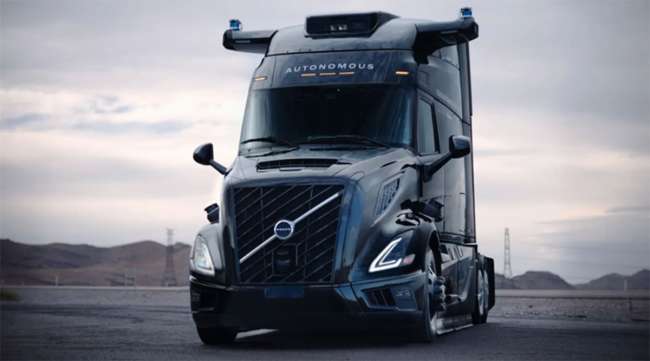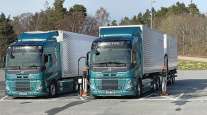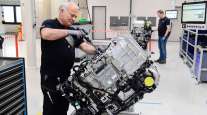Staff Reporter
Commercial Ops Debut Coming Fast for VNL Autonomous Truck

[Stay on top of transportation news: Get TTNews in your inbox.]
The start of commercial operations for factory-built autonomous Class 8 tractors by Volvo Autonomous Solutions and Aurora Innovation is due in a matter of days, giving birth to a whole new transportation ecosystem, according to executives at the Volvo Group AB unit.
Commercial operations of the trucks with a safety driver are set to launch “any week now,” VAS Head of On-Road Solutions Sasko Cuklev said during a Nov. 19 presentation.
The first batch of 25 autonomous trucks — configurations of the redesigned Volvo Trucks North America flagship VNL semi launched in January — was built at VTNA's New River Valley production plant in Dublin, Va.
Aurora’s technology was factory installed. It will be “a quality-assured product,” Cuklev told reporters during the presentation in Greensboro, N.C., adding: “It is not an upfitting.”

Cuklev
“We are not part of the traditional autonomous vehicle race,” he said. It is not “just give me your truck, and I will update it,” he added.
As a result, the autonomous platform used for the VNLs manufactured at New River Valley will be part of a redefined transportation ecosystem and the first step toward rolling out autonomous trucks across the Volvo Group portfolio, including Mack Trucks and Renault Trucks, according to Cuklev and his boss, VAS President Nils Jaeger.
RELATED: Volvo Begins Series Production of VNL Tractor in Virginia
“We have built an autonomous platform we can deploy across all brands,” Jaeger told analysts during Volvo Group’s Capital Markets Day in Dublin on Nov. 14, adding that the VNL is to be the first of many trucks.
“[The VNL] is an important part of a new autonomous transport system, and this transport system is different to traditional trucking,” Jaeger said. “And for that reason — and we’re the only [original equipment manufacturer] with that focus — we are creating a new transport ecosystem because we believe this ecosystem is required to facilitate toward the adoption of autonomy.

VAS President Nils Jaeger said the platform approach will allow the company to scale across geographies and use cases. (Volvo Group)
“So, this truck platform: It will give us leverage, it will give us scale, it will give us competitiveness, and it will lead to a strong market relevance,” he told analysts and shareholders.
“This platform approach, that will allow us to scale. We can scale across geographies. We can scale across use cases. We can deploy different drive lines. And we can utilize different business models, like transport as a service or truck as a service."
The first route for the trucks will be between Houston and the Dallas-Fort Worth metropolitan area. Four Aurora terminals in Texas are ready to launch in Dallas-Fort Worth, Houston and El Paso. VAS has an operations center in Fort Worth.
During a presentation Oct. 30, Aurora executives said the safety case for the Houston-to-Dallas route was 97% ready as of late October. Up to 10 driverless trucks will carry out commercial operations from the spring of 2025, they said. In the second half of 2025, the company expects to expand its product capabilities, add new lanes and increase capacity to tens of trucks.

Two years of testing saw the VAS and its partners iron out responsibilities, determine who should do what and the processes involved, said Cuklev. “It is not easy,” he said.
“We have been quite clear. This is an immature system. We are taking on all the risk,” he said, adding that Volvo was not competing with its carrier customers.
The Volvo VNL Autonomous truck was unveiled during a May 20 news conference at the Advanced Clean Transportation Expo 2024 in Las Vegas.
Host Seth Clevenger and Features Coordinator Mike Senatore take you behind the scenes to unveil the 2024 Top 50 Global Freight Companies. Tune in above or by going to RoadSigns.ttnews.com.
While fully self-driving trucks are on the way, the list of redundant safety systems in addition to the safety driver to be initially present includes braking, steering, communications, computation, power management and energy storage.
Volvo and Aurora began working together in 2018 on self-driving truck development and then announced a formal development partnership in March 2021, before debuting a prototype later that year.
“We have a clear road map. So we know that everything is in place. All the critical enablers are in place when we are at launch date. From launch, we will go to industrialization, and it is very important to understand that we are taking all the necessary steps to allow for the industrialization,” Jaeger said.
“We are ready from an ecosystem point of view. … When we are ready, we want to scale, and not [just] double-digit numbers” but rather hundreds and thousands of trucks, Cuklev said, adding: “We will be one of the winners.”
Want more news? Listen to today's daily briefing above or go here for more info
In addition to working with VAS, Aurora is collaborating on autonomous trucks with Paccar Inc., parent company of Kenworth and Peterbilt.
Daimler Truck has its own self-driving truck unit: Torc Robotics. Torc aims to commercialize fully autonomous trucks by 2027 and recently began validating fully autonomous trucks in a closed-course environment.
Rival German truck maker Traton, meanwhile, teamed up with Santa Clara, Calif.-based Plus to develop autonomous trucks. Traton is the parent company of International Motors, Scania and MAN.





